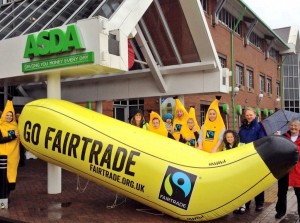Leeds Campaigners Apeel to Asda to sell more Fairtrade bananas
Campaigners from Leeds have called on Asda and Tesco stores to sell more Fairtrade bananas to prevent banana farmers and workers in the developing world suffering as a result of supermarket price wars.
They are asking the supermarkets to make the switch during November, when retailers typically negotiate supplier contracts for the year ahead.
Bananas are the UK’s favourite fruit – the UK public spends over £700m eating 5 billion of them a year – yet instead of making a decent living, many banana farmers that supply the UK are struggling to get by. For instance in Ecuador, one of the UK’s biggest suppliers, only 1 in 4 families working in the banana industry earns enough to take them above the poverty line.[1]
The UK retail price of loose bananas has almost halved over the past 10 years, while the cost of producing them has doubled[2]. Banana farmers and workers are paying the price for the nation’s cheap fruit, with many trapped in an unrelenting cycle of poverty. But retailers who source their bananas as Fairtrade[3] can assure their customers that despite retail price wars, farmers and workers producing the fruit continue to receive agreed, transparent Fairtrade prices and premiums.
Currently, one in three bananas sold in the UK is Fairtrade. Asda and Tesco are the focus of the public campaign as the two biggest sellers of bananas in the UK that still stock some non-Fairtrade bananas. In fact, both currently source less than 10% of their bananas on Fairtrade terms.
Hannah Langdana, chair of Fairtrade Leeds, said: “Fairtrade makes a real difference for banana farmers, enabling them to trade their way out of poverty, as well as giving them visibility in the global supply chain. We are calling on Tesco and Asda to switch all their bananas to Fairtrade – so that we have an independent assurance that banana farmers and workers are not suffering because of the supermarket price wars.”
More than eight in ten shoppers (including 85% of Asda shoppers and 84% of Tesco shoppers) say they would pay more for their bananas if the farmers and workers who produced them benefit as a result[4]. Shoppers say they trust independent third-party certification more than retailers’ own claims, with Fairtrade being the label they trust most to ensure that farmers and workers get a fair deal.[5]
Fairtrade is the only independent assurance that banana farmers are being paid a stable price, which aims to cover the cost of sustainable production and acts as a vital safety net when prices drop, as well as an extra Fairtrade Premium and fair contracts. Farmers can invest this additional amount as they choose, in their business or in social projects that benefit their community, such as schools, new roads and clean drinking water. Fairtrade also provides an independent assurance about working conditions and rights given to farmers and workers.
Globally, Fairtrade works with close to 25,000 banana plantation workers and small farmers across Colombia, Dominican Republic, Ecuador, Peru, the Windward Islands, Panama, Costa Rica, Ghana and Cameroon.
According to Alistair Smith from NGO BananaLink, banana workers “often work 10 to 12 hour days, six days a week… and still do not earn enough to meet their family’s basic needs. They regularly have to choose between food, schooling, rent and healthcare.” But in a recent study in Colombia, the main origin for all bananas sold in the UK, 96% of farmers said their economic situation had improved, on average by 34% since joining Fairtrade[6].
Michael Gidney, Chief Executive of the Fairtrade Foundation, said: “It seems absurd that bananas are the UK’s most popular fruit, yet many of the people who grow them are living in poverty. This isn’t what UK consumers want – they care about the conditions faced by the people who grow our food, and they want an independent assurance that retailers are doing the right thing. If Waitrose, Sainsbury’s and the Co-operative can sell 100% Fairtrade bananas, then Asda and Tesco can do better than their current offering of less than 10% Fairtrade, and no Fairtrade in some stores.”
“That’s why we’re supporting members of the public to send a message to Asda or Tesco, asking them to switch to Fairtrade bananas. It’s a simple action but by acting now, when retailers are negotiating their contracts for the year ahead, there’s a chance to make a significant difference to the lives of banana farmers and workers in the developing world, as well as their communities.”
The Fairtrade Foundation’s Make Bananas Fair campaign was launched earlier this year to put the issues facing banana farmers on the agenda of Government and retailers.
Shoppers who would like to send a message to Asda and Tesco can email the supermarkets directly through the Fairtrade Foundation website.
Notes –
- INCAE, Analysis of the Salary Structure in the Banana Industry in Ecuador, February 2012
- [2] Typical retail price is 68p per kilo, compared with £1.08 in 2002 (which adjusted for inflation is equivalent to £1.40 today).
- Sainsbury’s, Waitrose and The Co-operative source 100% of bananas as Fairtrade, other supermarkets source lower quantities.
- ICM online omnibus: nationally representative sample of 2,000 GB adults aged 18+, Feb 2014
- 64% trust slightly or a great deal, retailers’ own claims that farmers and workers are getting a fair deal, compared with 82% for Fairtrade certified products and 70% for products carrying any independent certification. ICM online omnibus: nationally representative sample of 2,000 GB adults aged 18+, Oct 2014.
- Corporation for Rural Economic Development, Colombia (CODER), Feb 2014 (survey data from Feb-Mar 2013) http://www.fairtrade.net/fileadmin/user_upload/content/2009/resources/140330-Banana-Colombia-Fairtrade-Impact-Study-final.pdf

